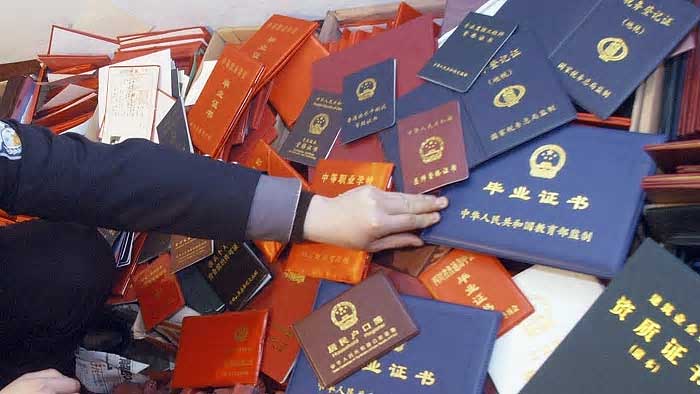
Financial Times reportst that Chinese authorities are cracking down on academic fraud after an international medical journal retracted 107 Chinese-authored papers from the past five years, in the biggest case to date of fake peer reviews to endorse research. Springer, publisher of the journal Tumor Biology, said the retractions were made because the peer review process — in which an independent academic recommends a paper for publication — had been "deliberately compromised by fabricated peer reviewer reports". China's ministry of science and technology said this week that the incident had "seriously harmed the international reputation of our country's scientific research and the dignity of Chinese scientists at large". It vowed a "no tolerance" approach to academic fraud. The government pledged to investigate the papers' authors and may strip them of their academic roles. All grant funding to the academics involved has been halted.
Shin Kawashima, a professor of international relations at the University of Tokyo writes on the Inquirer that China is taking a relatively cautious stance on the disputes involving the South China Sea . t is currently undertaking military reforms, and toward the end of 2016 Vice Adm. Yuan Yubai was appointed commanding officer of the Southern Theater Command, which is responsible for the South China Sea. Although China was expected to advance more aggressively into the waters, it is taking a moderate stance. One of the factors resides in the White House...China seems to want to establish a solid relationship with the United States before formulating other policies. Before establishing that solid relationship, China is expected to avoid making any major decisions that could increase the variables, although it may execute policies to some extent. Another factor is the domestic situation in China. As is well known, the year 2017 is the key year for Chinese President Xi Jinping. His top political priority is carrying out a reshuffle of personnel in the autumn without any problems and consolidating power in his second term. On the diplomatic front, he would like to stage major events every month until the autumn to emphasize the results achieved in the first half of his administration. To that end, he will not cause any trouble for some time to come. He will not take any bold steps until at least July, when China and the United States are expected to agree on economic issues.
- Reuters reports that A Chinese naval fleet held a scheduled military exercise with the Russian navy in St. Petersburg and Kaliningrad on Sunday in the first of planned exercises this year to strengthen their cooperation, state news agency Xinhua reported. The "Joint Sea-2017" exercise follows similar ones held last year, and more exercises will be held in late July in the Baltic Sea, and in mid-September in the Sea of Japan and the Sea of Okhotsk, it added... China and Russia are veto-wielding members of the U.N. Security Council, and have held similar views on many major issues such as the crisis in Syria, often putting them at odds with the United States and Western Europe.They have previously held naval drills in the fiercely-contested South China Sea. Meanwhile Associated Press reported that Iran's navy has conducted a joint exercise with a Chinese fleet near the strategic Strait of Hormuz in the Persian Gulf.The official IRNA news agency said Sunday's drill included an Iranian warship as well as two Chinese warships, a logistics ship and a Chinese helicopter that arrived in Iran's port of Bandar Abbas last week.
- 2017-06-16 As Trump Bets on China’s Help on North Korea, Aides Ask: Is It Worth It?
- 2017-06-15 ‘China Panic’: Beijing Envoy Accuses Critics of Fearmongering
- 2017-06-14 The Disappearance of a Chinese Deal Maker
- 2017-06-13 Panama Establishes Ties With China, Further Isolating Taiwan
- 2017-06-12 Protests Opposing China’s Crackdown on Housing Speculation Swell
- 2017-06-11 China Holds Firm to Its $5 Trillion Anchor as Fed, ECB Seek Exit
- 2017-06-09 The U.S. Is Ahead of China in AI Innovation—for Now
- 2017-06-08 China’s trade growth rebounds in May
- 2017-06-07 China Criticizes Pentagon Report, Laments U.S. ‘Cold War Mentality’
- 2017-06-06 California, China defy U.S. climate retreat with new cleantech tie-up
- Bloomberg South Korea Finance Chief Hopeful of Easing Tensions With China
- Financial Times US Navy adopts lower-key approach in South China Sea
- Reuters Chinese state oil giants take petrol price battle to the pumps
- Bloomberg Alibaba in America? Don't Bet on It.
- The Guardian Greece blocks EU's criticism at UN of China's human rights record
- New York Times China, Where the Pressure to Marry Is Strong, and the Advice Flows Online
- The Washington Post FBI offers $10K reward to help find missing Chinese scholar
- Reuters NFL star Tom Brady 'dreams' of playing football game in China
- Fox News Iran, China hold joint naval drill in Persian Gulf
- New York Times Chinese Bankers Flock to Hong Kong as Expats Retreat
- Financial Times MSCI set to rule on China A-shares and Brexit talks begin
- Forbes Fast Momentum Of China's Silk Road Push Helps Its Appeal, Jenny Shipley Says
- Financial Times Anbang's fall is a warning to acquisition targets
- www.straitstimes.com When China becomes region's most influential power
- Forbes How The New Silk Road Is Saving Lives
